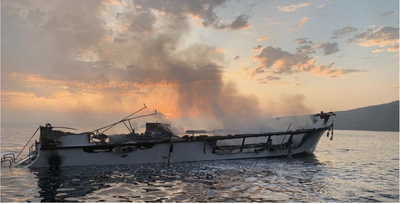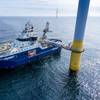Conception Captain Gets Four-Year Prison Term
The captain of a dive boat that caught fire and sank off the California coast in 2019, killing 34 people in one of the state's deadliest maritime disasters, was sentenced on Thursday to four years in prison for his conviction on a federal charge of seaman's manslaughter.
Jerry Boylan, 70, was found guilty by a U.S. District Court jury in November on a single felony count of "misconduct or neglect of a ship officer" under a federal homicide statute dating from steamboat accidents of the early 1800s.
Federal prosecutors had sought the maximum penalty of 10 years in prison, according to Thom Mrozek, a spokesman for the U.S. Attorney's Office in Los Angeles.
Defense lawyers, citing Boylan's age and health issues, had requested he be sentenced to five years on probation, including three years of home confinement.
Boylan, who had remained free on $75,000 bond following his 10-day trial, was ordered on Friday to surrender in July to begin serving his 48-month prison term.
In a brief statement read aloud in court by his attorney before the judge imposed sentence, Boylan said: "It was my goal to bring everyone home safely -- and I failed," according to the Los Angeles City News Service account of the hearing.
Boylan was captain of the 75-foot dive boat Conception when the vessel went up in flames in the early morning hours of Sept. 2, 2019, while anchored in Platt's Harbor near Santa Cruz Island, off the Santa Barbara coast, during a recreational scuba trip.
All 33 passengers and one crew member died in the Labor Day weekend blaze. They had been sleeping in a bunk room below deck when the fire began.
Media have called the blaze the most lethal modern maritime accident on record in California.
The five surviving crew members, including Boylan, had been above deck in berths behind the wheelhouse and escaped by leaping overboard as the burning vessel sank in the Pacific. They told investigators that flames coming from the passenger quarters were too intense to save anyone trapped below.
But the jury unanimously agreed with prosecutors that Boylan, as charged in the indictment, acted with "reckless disregard for human life by engaging in misconduct, gross negligence, and inattention to his duties".
Among lapses cited by prosecutors, Boylan neglected to maintain a night watch or roving patrol as required, failed to conduct sufficient fire drills and crew emergency training and left the vessel without attempting to fight the blaze or rescue passengers, even though he was unhurt.
Prosecutors said he was the first to abandon ship and did so without using the boat's public address system to warn passengers and crew about the fire.
Defense attorneys cast blame on the vessel's owner for not insisting on night patrols or fire training by his fleet's captains or crews.
Boylan's lawyers argued that the flames quickly closed in on their client, and that he remained on the boat long enough to broadcast a distress call to the U.S. Coast Guard and only jumped overboard when he was certain he would not survive otherwise.
While federal investigators failed to determine precisely what triggered the blaze, they found it began toward the rear of the main deck where passengers had plugged cell phones and other devices into lithium ion battery chargers.
Following the disaster, the Coast Guard issued a safety bulletin urging limits on such batteries and chargers aboard passenger vessels.
(Reuters - Reporting by Steve Gorman in Los Angeles; Editing by Chris Reese, Leslie Adler and Diane Craft)











